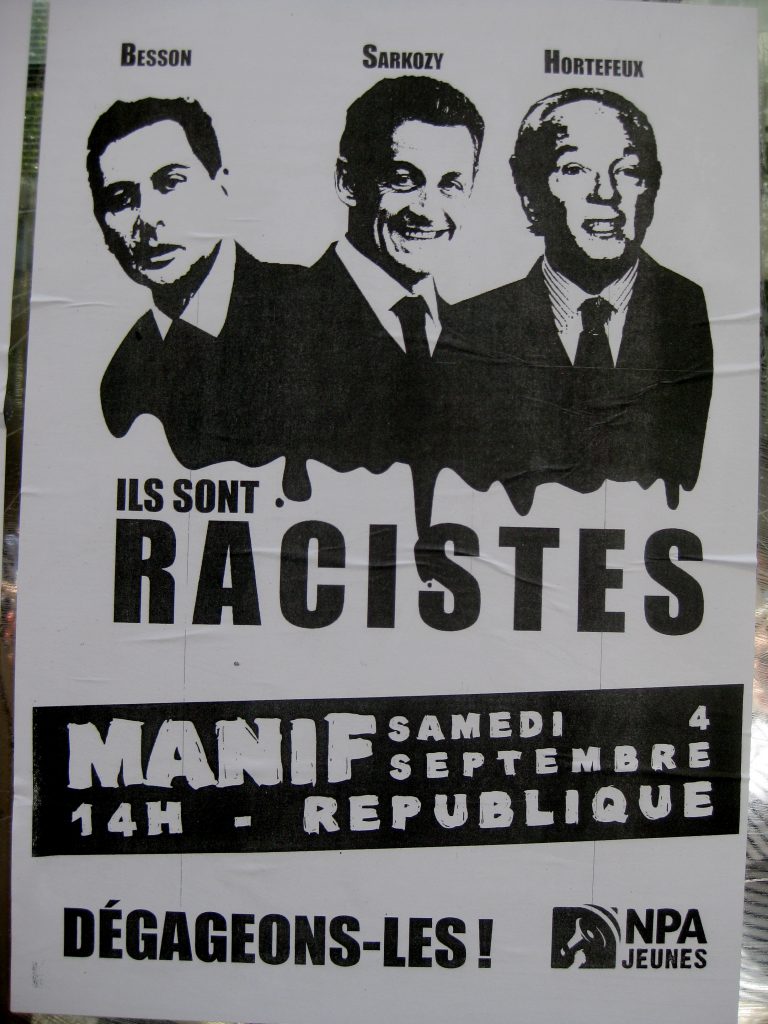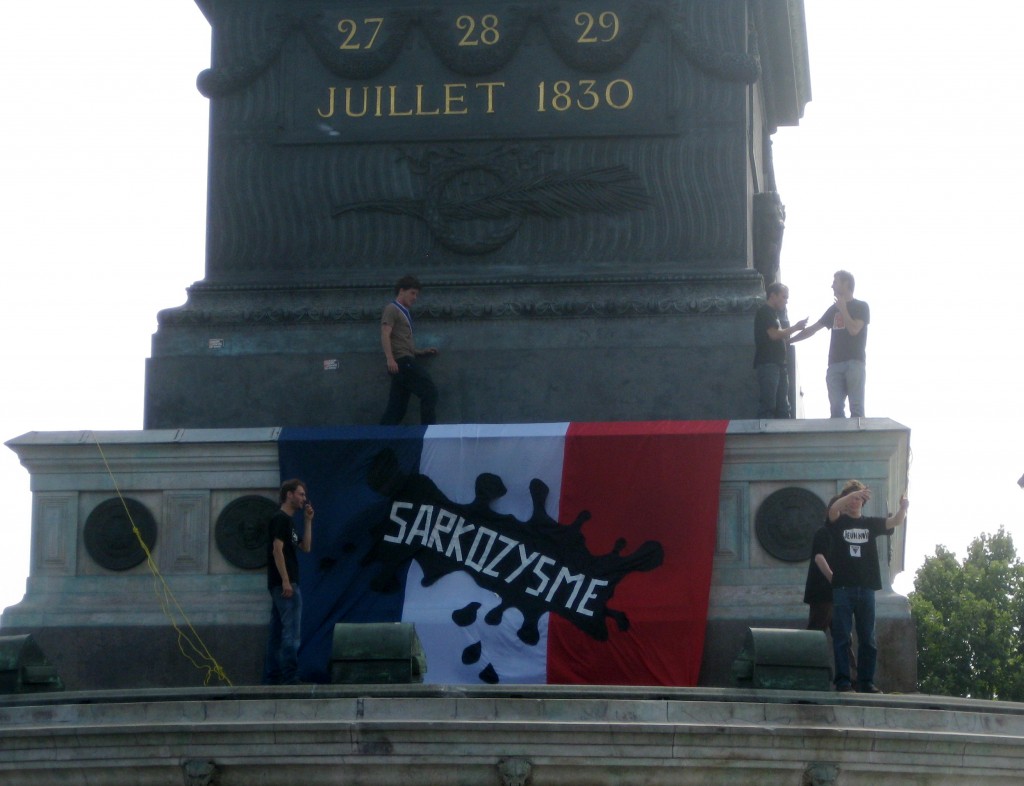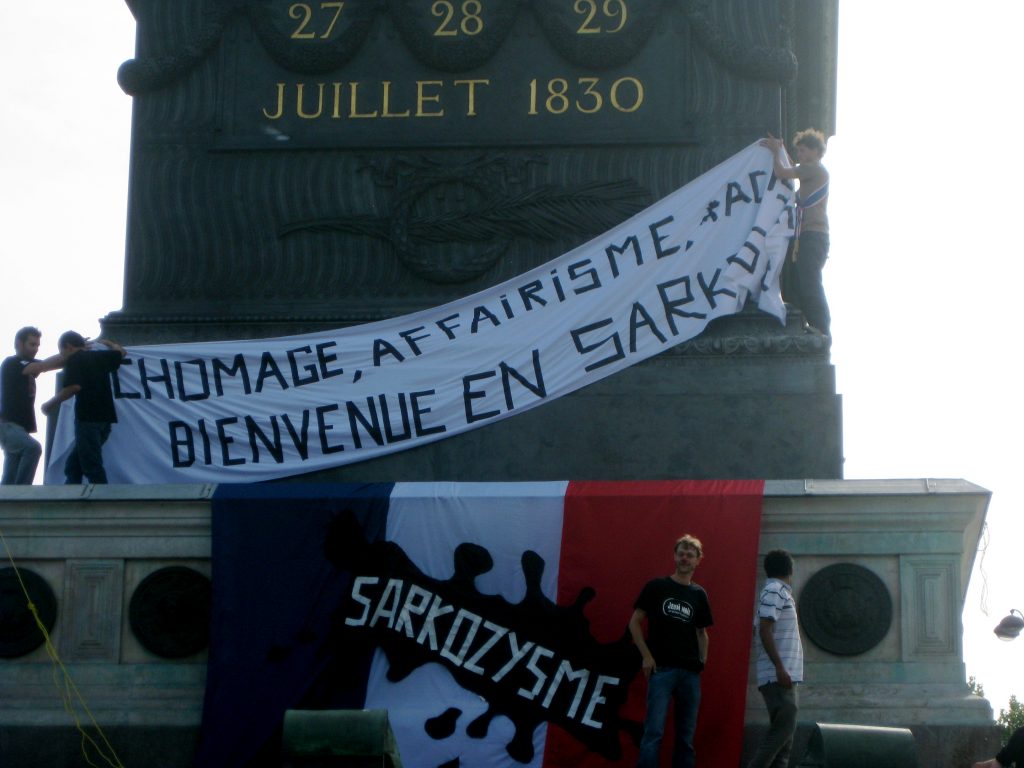Hi there! This is your friendly Global Comment editors speaking. Your regularly-scheduled article is below, but I’d just like a second of your time. See, we’re in pledge drive mode here. We need to raise some funds to continue to pay our fantastic writers to do the work they do, and we have a shiny new Support Us page where you can do just that!
I hate to admit it, but sometimes I am not quite sure why I go to protests. While my idealistic heart tries to lead me toward joining the masses demanding justice, my cynical mind tells me that my time is better spent reading trashy magazines while doing my laundry.
Nevertheless, protesting has become my personal addiction. Like a drug, I thrive off the momentary highs of hope, change, and political agency in the air. I relish the strange looks from camera-sporting tourists, supportive car honks, and even the occasional a**holes. A few days later, however, I crash back into cynical hopelessness.
However, this has not been the case in Paris.
 I have only lived in Paris for one week. During this week, there have already been two major national protests and a traditional “grève,” or general strike. As far as the headlines are concerned, these protests were about individual subjects such as the recent deportation of 1,000 Roma or President Sarkozy’s pending decision to raise the retirement age from sixty to sixty-two. Yet in the streets these protests extended far beyond any one political issue. Rather, they were a rallying cry to defend and honor the liberté, égalité, and fraternité that France has fought for throughout the centuries.
I have only lived in Paris for one week. During this week, there have already been two major national protests and a traditional “grève,” or general strike. As far as the headlines are concerned, these protests were about individual subjects such as the recent deportation of 1,000 Roma or President Sarkozy’s pending decision to raise the retirement age from sixty to sixty-two. Yet in the streets these protests extended far beyond any one political issue. Rather, they were a rallying cry to defend and honor the liberté, égalité, and fraternité that France has fought for throughout the centuries.
Saturday, September 4th, I read on the BBC that there were going to be massive protests throughout Paris against the recent mass deportations of the Roma. Since I like to experience countries through their protests in the way that normal travelers go to beaches and nightclubs, I had to go.
In Paris, it is all too common to see the tourists at Notre Dame or the Eiffel Tower feeding baguette crumbs to fat pigeons while they refuse to give a centime or a piece of bread to a dark-skinned woman in a headscarf and a long dress begging for money. These people are Roma or “Gypsies,” a people with Punjabi origins (mistakenly thought to be Egyptian) who have been migrants throughout Europe since as early as the 8th century. Now, though they are often Romanian nationals, they typically live in makeshift camps throughout Europe in an effort to escape continuous persecution and ethnic discrimination.
Since August, President Sarkozy has deported around 1,000 Roma back to Romania and Bulgaria in an effort to address immigrant-related crime. Though he claims that the Roma left “voluntarily” (each adult was given 300 euro to leave, a kingly sum for an impoverished person), both the European Union and, as I later learned, the French people have criticized this move as illegal according to international law and indicative of Sarkozy’s xenophobic policies.
 At first, the protest was just a typical protest—but on steroids. Tens of thousands of people (organizers estimate 50,000) marched to the beat of Roma music, chanting, “Say no to repression” and “No to Sarkozy’s inane policies.” Different organizers from various socialist, unionist, and pro-immigrant organizations passed out their literature. Musicians played, journalists interviewed, and people with perfect Parisian apartments looked out their windows to observe the uproar du jour.
At first, the protest was just a typical protest—but on steroids. Tens of thousands of people (organizers estimate 50,000) marched to the beat of Roma music, chanting, “Say no to repression” and “No to Sarkozy’s inane policies.” Different organizers from various socialist, unionist, and pro-immigrant organizations passed out their literature. Musicians played, journalists interviewed, and people with perfect Parisian apartments looked out their windows to observe the uproar du jour.
Soon, the procession arrived at Place de La Bastille, the very place where the Bastille was stormed in 1789. The Colonne de Juillet now majestically resides in the center, commemorating the revolution with the words “liberté, égalité, fraternité” embossed on the marble base. Tossed over the historic, ornate monument was a giant French flag stained black with the words, “Le Sarkozesyme” scrawled across it.
When young French men in traditional tricolors (bands of red, white, and blue worn by French revolutionaries) began climbing the monument, hanging a banner that read, “le chômage, l’affairisme, le racisme” (unemployment, racketeering, and racism), it became evident that this protest was far bigger than just the Roma. It was a protest for France.
Unlike most American protesters, the French have not yet given up on their country. Instead, they see it in imminent danger of succumbing to virulent “French” policies, combined en masse as “Le Sarkozyesme” that might permanently stain the liberté, égalité, and fraternité that they have fought for since the revolution.
Perhaps I was drunk off of tricolor sashes, lunchtime wine, or the novelty of being in a new place, but watching young men vault over the gates of Place de La Bastille in the name of liberté, égalité, and fraternité brought tears to my eyes. It felt as if there was an actual semblance of hope—that the revolutionary spirit was alive, and a state created by the will and spirit of its citizens was both possible and necessary. Protesting in France was not merely demonstrating support, but an act of genuine power, freedom and political agency that I have never felt in the land of the free and the home of the brave.
By Tuesday, the uproar du jour had changed from le racisme to l’affairisme.
Recently, the right wing has argued that the French are “victims of their own social welfare success” and must pay the price of a leisurely thirty-five hour work week by retiring at sixty-two instead of sixty. Without these extra taxes, the state claims that it cannot continue to pay for pension plan services. Naturally, France responded with a twenty-four hour “grève,” or general strike, that closed several metro lines and caused numerous delays and cancellations at the airport. Despite torrential rains in the south and the lack of mobility caused by the strike itself, over one million left their jobs for the day and took to the streets in protest.
In the interest of cultural comparison, the United States will most likely also raise the retirement age from 65 and cut already limited benefits. However, it is hardly in the newspaper, much less pouring off of the headlines and into the streets.
As an American, it is difficult to imagine a strike, especially a seemingly incomplete one, bearing political agency. Twenty-four hours of grassroots inconvenience seems flimsy in the shadow of bureaucratic politicians. Especially those like Sarkozy who are notorious for ignoring the populace and pushing their own personal agendas.
The strike itself did not necessarily freeze France. In Paris, the effects of the strike made it seem like the city was moving through Jell-O. Paris was completely congested by crowded trains, inconvenienced commuters, and discombobulated travelers. Suddenly, Parisians were waiting for twenty-five minutes for a train, when they are accustomed to waiting no more than three. People were inconveniently crammed together, holding onto their bags and sighing away the minutes at their usually seamless transfers. Many people flying out of Paris faced delays and cancellations, creating a chaotic mess of disgruntled people who felt personally assaulted. However, in this sense, the strike projected a futuristic image of France as a dysfunctional country plagued by policies that continually fail its citizens.
 Like any political issue, both of these issues are nuanced. One must consider how the French system is one of give and take; there can only be services if there is money to provide them. With longer life expectancies than there were when the retirement age was instituted after World War II, one could argue that raising the retirement age accommodates the demands of the times.
Like any political issue, both of these issues are nuanced. One must consider how the French system is one of give and take; there can only be services if there is money to provide them. With longer life expectancies than there were when the retirement age was instituted after World War II, one could argue that raising the retirement age accommodates the demands of the times.
But the word on the street is that these nuances are not what are important right now. France is merely using these issues to fight for its pride and principles that they have fought for and defended in some form for its entire history. Whether it is open borders and rights for all or the fair labor standards that they have fought for, sometimes it’s necessary to put the debate aside as they do what they historically do best –don the tricolor, institute une grève, and rally the people.
Like this story? Want to see more like it? Hop right over to our lovely Support Us page and pledge a few bucks to help us keep bringing you independent voices from around the world. We appreciate your love! Just a couple of dollars and we won’t interrupt your stories anymore…

Dear Anna,
I hate to burst your romantic French bubble, but you took the good old Gallic bait, hook, line and sinker and what’s a European guy to do? The wine is fine, the food is good and wow, don’t we all feel like retarded hillbillies with so much sophistication. Like I said, you happily swallowed the delicious bait and for the French you’re the living proof of American naivity.
Like every year in France, July and August mean vacation and September means strikes. There is no Frenchman that trusts their government and rightly so. Europeans don’t even consider France to be a democracy and the only way for the French people to have a say is to paralyze the country. It’s a rather primitive way, but it’s the French way. These guys are so stuck in the seventies that it would be foolish to take them seriously, but hey, some people believe in Santa Claus.
“To fight for its pride and principles.”
Are we living on the same planet?